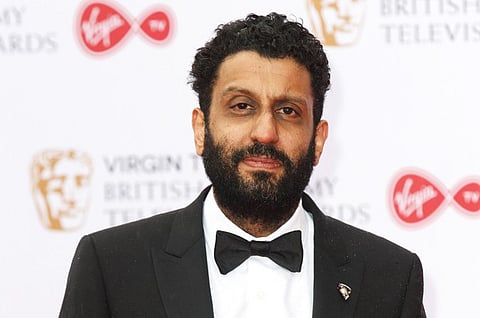Adeel Akhtar on being a Muslim funnyman
As his new film ‘Swimming With Men’ opens in the UK, the actor talks about masculinity, middle age and the pressure of playing a Muslim

Adeel Akhtar has a face that you could stare at for hours. You might call it hangdog, but in those dark, rather tired eyes there is both a humanity and a sense of humour, a hint of irony and a sense of resignation. It’s a face that has served Akhtar well in the past few years: he’ll be familiar to TV audiences for roles in three highly acclaimed series; Unforgotten, The Night Manager and BBC One’s psychological thriller River, and on film for his parts as Naveed in The Big Sick, Smee in Joe Wright’s Pan and as a bumbling jihadist in his breakthrough role in Four Lions in 2010.
Last year, his reputation soared when he won a Best Actor Bafta for his devastating, all-consuming performance as a patriarch raging at his daughter’s disobedience to deadly effect in the BBC Three drama Murdered by My Father, becoming the first non-white British actor to do so. I imagine that doors duly swung open, with Akhtar being allowed that rare chance to play a range of roles that are not specifically created for Asian actors.
“I am sitting down with people more — people are more interested in stuff I have to say: producers, directors, journalists. They want my perspective,” he says.
He agrees stereotyping is less of an issue than it once was and points to his forthcoming role as Monsieur Thenardier, the villainous landlord, in Andrew Davies’s new adaptation of Les Miserables, which will begin on the BBC in January next year.
“It’s an amazing feeling and shows how far we have progressed. It’s gone from me not having a look in with something like that 10 years ago, to me being in it.”
We are meeting in the suite of a smart London hotel to talk about Swimming With Men, a new British comedy directed by Oliver Parker which, in the style of The Full Monty, fully mines our appreciation of the underdog. Akhtar plays a member of a men’s synchronised swimming team who, against the odds, make it to the world championships. Rob Brydon’s depressed Eric uses his unlikely form of team bonding to win back his wife (Jane Horrocks), and the film says much about middle-aged anxiety, male friendship and a crisis in masculinity.
“The frayed edges of people are what we love seeing in this country,” says Akhtar. “It’s a very British trait to only give a crisis the amount of attention it really needs. The best response to low-grade depression is to pull focus and have fun. And it’s also a very British thing to do something in a way that is beneficial to the group.”
Akhtar is 37, and was born to first- generation immigrants — a Pakistani father and a Kenyan mother who met, rather romantically, at Heathrow Terminal 3. His father worked hard to retrain as an immigration lawyer and sent his son to Cheltenham College. He says of his time there: “When you are one of two or three brown people in your school, you learn to normalise your difference very quickly. That’s an amazing quality that kids have, I think. Only looking back do I think about [the differences]. I remember speech day and it was full of women in hats pulling strawberries and cream out of their hampers. My parents were there in traditional dress and when they opened up their hamper it was full of things like shish kebabs. Your differences are completely obvious, but you make it work.”
Akhtar’s father was determined that his son should follow him into law. He dutifully studied for a law degree at Oxford Brookes, but it made him unhappy. “I didn’t actively hate it, I was just doing what everyone else was doing, and trying to be sensible. But I found all the reading really difficult.”
In 2002, he followed his girlfriend of the time to America to audition for the Actors’ Studio. Akhtar had performed with the National Youth Theatre and loved it, thought it was the only thing he had ever been good at. He passed the audition, but en route was caught up in a life-changing incident. He had his passport taken away at Heathrow and was told he could pick it up in New York. However, on arrival, a fleet of FBI cars pulled up alongside the plane and he was arrested, wrongly suspected of terrorism.
It’s no wonder, then, that Akhtar says he found drama school to be “a refuge”. If there is any residual anger, he doesn’t show it, but there is no doubt that it made him think about his identity.
“As a British Asian man, the success I’ve had is off the back of a lot of stuff that has had a political context or a social context. I don’t have the luxury of taking it lightly. I consider playing a Muslim as I would any other part, but at the same time you do have to think about how a job affects a community of people, and I feel the effects of what it means symbolically to be an Asian actor in the industry. I understand what the weight of that is.”
He does, however, sound a note of caution. “There is a danger of being self-congratulatory about how far we’ve come and not really acknowledging certain stories.”



